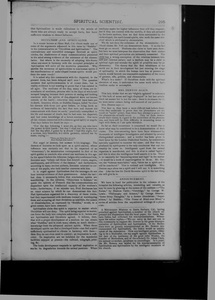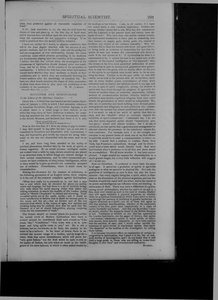Occultism and Spiritualism (1)
In a recent lecture at Paine Hall, Col. Olcott made use of some of the arguments advanced in this issue by “Buddha” in his communication on “Occultism and Spiritualism.” The contradictory and untruthful messages received at spirit-circles, the shallowness of many communications presented to his mind strong evidence of the existence of the elementaries. But where is the necessity of adopting this theory when one more in harmony with the accepted principles of Spiritualism will solve all the mysteries presented. Why ascribe the nonsense of spirit-circles to non-human spirits if the manifestations of undeveloped human spirits would produce the same result?
It is asked why this communion with the departed, in the present form, has been delayed until now? The question assumes that spirit-communion is of recent date; but in reality evidence is not wanting to prove that it has existed in all ages. The mediums of the day, many of them, are descendants of mediums, persons who in the days of witchcraft escaped hanging because their powers oi seeing and holding converse with the spirits of the departed were not known outside of the family; otherwise they would have been put to death. Socrates, whom, as Buddha charges, failed “to class his daemon with those just gone before, or bring forth as evidence of immortality the fact that men and women did communicate with those on earth,” practically exemplified in his life and manner of death, that he had seen the departed, and had some knowledge of a future existence. Nor were all his visions connected with a daemon (good spirit) or angels. Two days before his death he says: —
“For the day following I must die, as they say who have the power in their hands; but that I shall not die to-morrow, but the day after, I guess by ‘a dream’ I had this night, that a woman, very beautiful, in a white garment, saluted me by name, saying: —
Rich Phithya shall behold.”
Not angel or daemon, but woman is his language. The daemon of Socrates we look upon as a spirit control, whose influence was certainly not that to be expected of an “elementary”; its ministration corresponded to that of the spirit guides or controls who attend our mediums in this age. In his speech before the Athenian Judges who condemned him, Socrates says “others call those that foretell events, augurs, soothsayers, and diviners—I the daemon,” and furthermore, according to many ancient authors, Socrates returned to certain of his pupils, who held familiar converse with him.
It is urged against Spiritualism that the messages do not bear internal evidence of their genuineness. Admit the tact t but does it necessarily follow that non-human spirits are manifesting. In the editorial, “Objections to Science,” we quote the opinion of Plutarch that the communications are dependent upon the intellectual capacity of the medium's brain; furthermore, if we mistake not, Prof. Buchanan has an exact science by which he can demonstrate this fact. Had Spiritualists organized for a discovery of these truths, had they experimented with mediums instead of worshipping them and accepting all their dictations as infallible, the causes or dissatisfaction, as expressed by “Buddha,” would, to a great extent, have been removed.
Spiritualists claim that spirit is superior to matter: which Occultists will not deny. The spirit being superior to matter, can force the body into complete subjection to it; herein also are Spiritualists and Occultists agreed. It follows, then, that with a proper development of a medium we can obtain what “Buddha,” and in truth many others, so much desire—knowledge from the advanced ancient spirits. When these developed spirits can find a developed brain—can find a spirit sufficiently spiritualized to vibrate in harmony with them—then they do not even need to control; an inspiration is sufficient. To inspiration are we indebted for the wonderful facilities enjoyed at present—the railroad, telegraph, printing, &c.
The brain development responds to spiritual aspiration or marks its degradation towards the animal passions. When mediums aspire for higher influences then will they respond; but if they are content with the worldly, if they are actuated by the lower motives, then we find them surrounded by the undeveloped, the earth-bound spirits, who work the same mischief which is attributed to elementaries.
We do not deny the existence of the elementaries; Col. Olcott claims Mr. Felt can demonstrate them. If so the fact must go on record. Mediums also claim to have seen them; but here we must interpose the observation that their visions and their spiritual perception are intimately connected. The child has a wrong conception of the relations between himself and external nature; and a medium may be a child in spiritual sight and mistake the spirit of primitive man for an elementary. The theory that the first inhabitants of the world are in their development but just entering the stage of spirituality to which the human race has at present attained, would furnish one reasonable explanation of the vision of gnomes, elfs, goblins, and elementaries.
What’s in a name? If Occultism deals with the spiritual elevation of man, it undertakes the same work which Spiritualism seeks to accomplish.
Occultism and Spiritualism (2)
To the Editor of the Spiritual Scientist:
Dear Sir: — A friend has just handed me the London Spiritualist of January 7, 1876, in which I find extensive reference to American Occultism, Magic, and Cornelius Agrippa, in all of which there is a latent laugh in their sleeves at the will-o’-the wisp chase of their American brethren, for somebody has searched the rich collection of necromantic works in the British Museum, and declared that there is in it only
“Much crie and little woo', |
Now at this late date, if I drive my sheep or pigs to market, I may find myself “a day after the fair,” yet, as one who is interested in Occultism and dissatisfied with Spiritualism, I may, not improperly, give briefly my reasons for being interested in the one and dissatisfied with the other woo’ or no woo’.
I am, and have long been satisfied of the reality of spiritual phenomena, whether they be the work of spirits or human ingenuity. By an occult process, intelligent replies are evoked from a table by raps, certain sensitives are placed in an abnormal state, in which things are uttered foreign to their normal consciousness, and by other innumerable processes we have evidences of ultra human intelligences, which to deny would be to give up forever the commonly accepted law of evidence. Nevertheless, there is much room for dissatisfaction.
Making due allowance for the element of unfairness, in the following quotataion of an English writer, there remains in it the zest of the common complaint against Spiritualism.
“What they really try to persuade us is, not that a man has a soul which may be elevated far above our earthly wants and longings, but that there is a set of invisible beings who walk about the world playing tricks with tables and talking nonsense, to which the twaddle of the Yankee young ladies in “Martin Chuzzlewit” is refined and elevating. Their so-called spirits are of the earth, earthy; and it would be more satisfactory to believe that at death we became parts of the ocean and the air, —that we formed part of the raw material from which, in the course of ages, new sentient and thinking being may be evolved, than that we sank into the likeness of a set of stupid hob-goblins, playing conjuring tricks for the amusement of fools.”
The honest skeptic no sooner places his presence within the sacred circle of Modern Spiritualism then there is evoked around his bewildered head such sounds as “Like draws like,” “Conditions,” “You came with a lie in your heart and lying spirits come to you,” etc.’ He is not a believer, but no one knows, as he does, the anxiety in his heart to be a believer. In his heart of hearts there is enshrined the sainted image of a mother, and he longs for a token from that sweet remembrance which will prove her “only gone before," but the fruit which he tasts is only as the apples of Sodom, the only token an insult to the intelligence of his most beloved, to which is often added insults by the medium or her friends. I ask, in all candor, if I have not stated fairly a very common experience. Further, the average thinker cannot fail to ask, Why has this communion with the departed, in the present form and extent, been delayed till now? Why have they—the spirits—almost invariably represented themselves in times past as something else <... continues on page 1-124 >
Editor's notes


